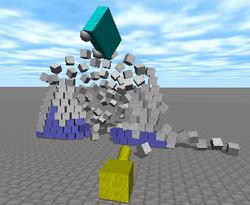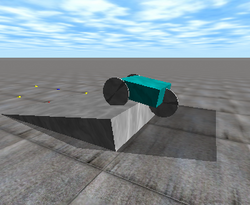Software:Open Dynamics Engine
 | |
 | |
| Developer(s) | Russell Smith |
|---|---|
| Initial release | May 8, 2001 |
| Stable release | 0.16.2
/ July 30, 2020[1] |
| Repository | bitbucket |
| Written in | C/C++ |
| Operating system | Platform independent |
| Type | Physics engine |
| License | BSD[2] |
| Website | www |


The Open Dynamics Engine (ODE) is a physics engine written in C/C++. Its two main components are a rigid body dynamics simulation engine and a collision detection engine.[3] It is free software licensed both under the BSD license and the LGPL.
ODE was started in 2001 and has already been used in many applications and games, such as Assetto Corsa, BloodRayne 2, Call of Juarez, S.T.A.L.K.E.R., Titan Quest, World of Goo, X-Moto and OpenSimulator.
Overview
The Open Dynamics Engine is used for simulating the dynamic interactions between bodies in space. It is not tied to any particular graphics package although it includes a basic one called drawstuff.[4] It supports several geometries: box, sphere, capsule (cylinder capped with hemispheres), triangle mesh, cylinder and heightmap.
Simulation
Higher level environments that allow non-programmers access to ODE include Player Project, Webots, Opensimulator, anyKode Marilou and CoppeliaSim.
ODE is a popular choice for robotics simulation applications, with scenarios such as mobile robot locomotion[5][6] and simple grasping. ODE has some drawbacks in this field, for example the method of approximating friction and poor support for joint-damping.[7]
See also
- OPAL – the Open Physics Abstraction Layer, originally built on top of ODE
- Physics Abstraction Layer – The original Physics Abstraction Layer
- Newton Game Dynamics
- Bullet – another open source physics engine used in commercial games and movies
- Chipmunk – a similar physics engine intended for 2D applications
- Vortex
- Project Chrono
References
- ↑ "Downloads". https://bitbucket.org/odedevs/ode/downloads/.
- ↑ ODE's license
- ↑ "Open Dynamics Engine - Intel Threading Building Blocks [Book"] (in en). https://www.oreilly.com/library/view/intel-threading-building/9780596514808/ch11s14.html.
- ↑ "odedevs / ode / drawstuff". https://bitbucket.org/odedevs/ode/src/master/drawstuff/.
- ↑ Brezina, Tomas; Jablonski, Ryszard (2009-11-29) (in en). Recent Advances in Mechatronics: 2008 - 2009. Springer Science & Business Media. ISBN 978-3-642-05022-0. https://books.google.com/books?id=AZu-yVo1MIsC&dq=%22Open+Dynamics+Engine%22+-wikipedia&pg=PA215.
- ↑ Yıldırım, Şahin; Arslan, Erdem (2018-08-01). "ODE (Open Dynamics Engine) based stability control algorithm for six legged robot" (in en). Measurement 124: 367–377. doi:10.1016/j.measurement.2018.03.057. ISSN 0263-2241. https://www.sciencedirect.com/science/article/pii/S0263224118302422.
- ↑ Drumwright, Evan; Hsu, John; Koenig, Nathan; Shell, Dylan (2010). "Extending Open Dynamics Engine for Robotics Simulation". in Ando, Noriaki; Balakirsky, Stephen; Hemker, Thomas et al. (in en). Simulation, Modeling, and Programming for Autonomous Robots. Lecture Notes in Computer Science. 6472. Berlin, Heidelberg: Springer. pp. 38–50. doi:10.1007/978-3-642-17319-6_7. ISBN 978-3-642-17319-6. https://link.springer.com/chapter/10.1007/978-3-642-17319-6_7.
External links
- Bitbucket: ODE project page
- Open Dynamics Engine (ODE) Community Wiki
- (Old) Official ODE Homepage
- (Obsolete) Python-ODE Bindings (pyode)
- The ode4j project, a Java port of ODE
- The ODE.NET project, a C# wrapper for ODE
 |
